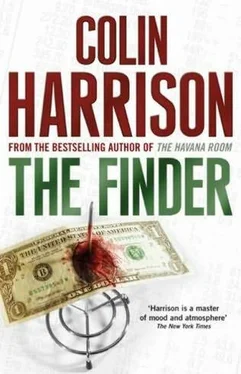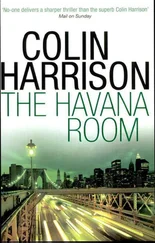Colin Harrison - The Finder
Здесь есть возможность читать онлайн «Colin Harrison - The Finder» весь текст электронной книги совершенно бесплатно (целиком полную версию без сокращений). В некоторых случаях можно слушать аудио, скачать через торрент в формате fb2 и присутствует краткое содержание. Жанр: Триллер, на английском языке. Описание произведения, (предисловие) а так же отзывы посетителей доступны на портале библиотеки ЛибКат.
- Название:The Finder
- Автор:
- Жанр:
- Год:неизвестен
- ISBN:нет данных
- Рейтинг книги:4 / 5. Голосов: 1
-
Избранное:Добавить в избранное
- Отзывы:
-
Ваша оценка:
- 80
- 1
- 2
- 3
- 4
- 5
The Finder: краткое содержание, описание и аннотация
Предлагаем к чтению аннотацию, описание, краткое содержание или предисловие (зависит от того, что написал сам автор книги «The Finder»). Если вы не нашли необходимую информацию о книге — напишите в комментариях, мы постараемся отыскать её.
The Finder — читать онлайн бесплатно полную книгу (весь текст) целиком
Ниже представлен текст книги, разбитый по страницам. Система сохранения места последней прочитанной страницы, позволяет с удобством читать онлайн бесплатно книгу «The Finder», без необходимости каждый раз заново искать на чём Вы остановились. Поставьте закладку, и сможете в любой момент перейти на страницу, на которой закончили чтение.
Интервал:
Закладка:
Maybe he had said something more to James. Was it possible? Maybe he had said something like, "Play rough, if you have to." To which James had given a solemn, tight-faced nod. Had Tom said that? Could he have actually said that? (He felt calm!) "I know people who know some people." Why could he now hear James saying that to him? Why did it sound like something James would say, with a touch of the Brooklyn streets in his voice? They'd talked early one morning, at around eight a.m., when the caffeine was pushing Tom along, jacking him up. I know people who know some people. That was bad. Play rough. That was bad, too. Had these things really been said?
Tom looked over at Ann. She spent the day with patients. Blissful. Had no idea what he was walking into. He felt calm.
As soon as she'd stirred that morning, they'd come to her: Mrs. Thompson, with the heart disease; Mr. Bernard with the bad liver; Harriet Gorsky with end-state renal failure; her patients, all 1,690 of them, a milling, shuffling, coughing, anxious crowd in her mind, divisible by age and sex and of course illness as well as probable illness. Her lung cancer patients, for instance: the patients who in all likehood might have it, pending tests; did have it and were realizing they would die before too long; and those who were in the bed now, coughing weakly. Or there were the many women with anxiety disorders, who ranged from mildly obsessive to those needing immediate hospitalization. Put her in a room with all of these people (no, please don't) and she would be able to drift from one to another sensing disease in many cases, suddenly recalling the string of data that came with each patient, the hemocrit level, the path report, even height and weight at the last checkup. And their histories, their secrets-an enormous psychic burden she tried not to carry but always did. She cared for them, she found them interesting, this selection of humanity, skewed of course toward those who had health insurance and women (men so obstinate about caring for themselves). A few she genuinely didn't like, a few she might cry over when the end came, and a few she even loved, from afar, mostly, chastely, no hint betrayed, of course. Some of the older men who'd lost their wives came in wearing a coat and tie, as if still working, and they often were stoical and silent as she described their conditions, what the problem was. They pursed their lips and nodded, rubbed their dry hands together like it was just a financial matter requiring they write out a very large check. Broke her heart. Maybe they reminded her of her father in his last years. How could they not? They were human beings. They stood nearly naked before her (the men with their loose underwear lowered as she felt for hernias, common in older men and potentially quite serious if infection set in, or testicular swellings), they had odors (women generally wore perfume and cleaned themselves better), they burped softly, farted, grunted. Very occasionally they urinated by accident, especially during an anal exam. She never betrayed any emotion at this, never showed that such behavior was in any way shameful. Because it wasn't. We are animals and subject to the mortification of the flesh. Born so that we may die.
She looked over at Tom in the car. Lost in his thoughts. Seemed calm-for him, anyway. Hadn't asked her about her day. Had barely kissed her hello when she got into the car. Was she angry with him? Yes, but more than that, discouraged. They each worked too hard, they carried too much… and with that the day came back to her… after lunch she'd seen a young married man who complained of chest and stomach pain but admitted that he had just had an affair with his wife's divorced younger sister and probably given her herpes. Ann nodded patiently but thought, You creep. Ann had handed the man a prescription and told him to tell his wife, who was also her patient. Next was a young woman who'd asked to have her antidepressants adjusted upward. The woman was clinically obese, so much so that the fat had reached the last knuckle on each of her fingers, and was a heavy smoker. Ann had spoken sternly to her about her lungs and heart but doubted it would have any effect. The next patient had been an elderly woman whose lower spine and pelvis were deteriorating because of severe arthritis. She moved slowly, apologizing unnecessarily as Ann inspected her lumbar region.
So different from one another, these human beings. If you are a doctor, you have secret knowledge of these differences. And if you have secret knowledge, then you are always at risk of knowing things about people you love, knowing the very thing that you prefer not to know. And now there was something about Tom that was bothering her. She didn't know if she felt this or knew it, or if she felt it as his wife or as a doctor. He was, to all outward appearances, an utterly healthy forty-two-year-old man, six foot one, perhaps 230 pounds, which was too heavy, but vigorous. Yet there was something, a twitch in his eye, a distracted irritability. The animal was under stress, unusual stress. He'd said nothing. Either he knew what was wrong or he didn't. But she sensed that he knew exactly what was wrong. Underneath that affable glad-hander was a sharp mind. Tom could be very tough with people. He compartmentalized, internalized, rationalized. Valuable abilities in a corporate setting, she knew. But the animal always won. This is what she'd learned from her patients. The brain was an organ that privileged itself before other organs, arranged the perception of reality for its own comfort. But it could not control the body's reaction to its own perceptions, the secretion of hormones, the cellular flux. Tom was acting like nothing was wrong. He seemed calm, but she knew he was not. Something was wrong. Right now, as he was staring out of the window of the town car, telling her nothing. Why?
"This is it," he said to the driver.
A lovely apartment! Huge! High in the air! Some of the people were actual billionaires, not that it mattered to Ann. She chatted, drifted, let Tom do his thing, talk to the big wheels, over in the corner, each holding his drink. She'd shaken hands with some people but found her way to a huge sofa and sat there happily, half hidden by a giant spray of lilies, accepted a glass of white wine. The servants were all tiny Guatemalans. She was too tired to be of much use to Tom. So she watched. She'd been introduced to Connie, the youngish wife of someone important there, so Ann studied her. The woman sported a very expensive boob job. How natural and yet grotesque! How impossible yet marvelous! One hardly knew who was most responsible for this aesthetic state of affairs, men or women themselves. And yet, equally strange to Ann was the fact that the fake tits worked. Men who were otherwise among the most sophisticated and brilliant, worldly and perceptive, lawyers, bankers, artists-men who had buried parents, friends, spouses, even children, and who thus knew the essential tragedy of the flesh-were themselves so often rendered helpless before these unnatural yet unarguably beautifully executed falsies. Smart men! Thoughtful, sensitive men! Doctors! Yes, doctors, who should know better, who were well informed about infection rates, adhesions of muscle tissue, immune system response, nerve damage, tissue scarring, ligament failure, the complications of burst implants, and so on. Yes, even doctors. The male response was hardwired in, kicking off testosterone pulses in the endocrine system. Couldn't help themselves. Helpless. Helpless men. They lost the power of discernment and resistance. They lusted, and in the glare of that lust, women gained power, if for only a moment.
Now Connie spied Ann across the room, turned, and came to her, smiling with professional hospitality.
"Are you-you seem to be-"
"I'm sorry-bit tired. Long day."
This admission was on the outer edges of Manhattan dinner party protocol. You never admitted weakness or insufficiency. "Oh, are you-what-?" ask Connie politely, one eye on the room.
Читать дальшеИнтервал:
Закладка:
Похожие книги на «The Finder»
Представляем Вашему вниманию похожие книги на «The Finder» списком для выбора. Мы отобрали схожую по названию и смыслу литературу в надежде предоставить читателям больше вариантов отыскать новые, интересные, ещё непрочитанные произведения.
Обсуждение, отзывы о книге «The Finder» и просто собственные мнения читателей. Оставьте ваши комментарии, напишите, что Вы думаете о произведении, его смысле или главных героях. Укажите что конкретно понравилось, а что нет, и почему Вы так считаете.












